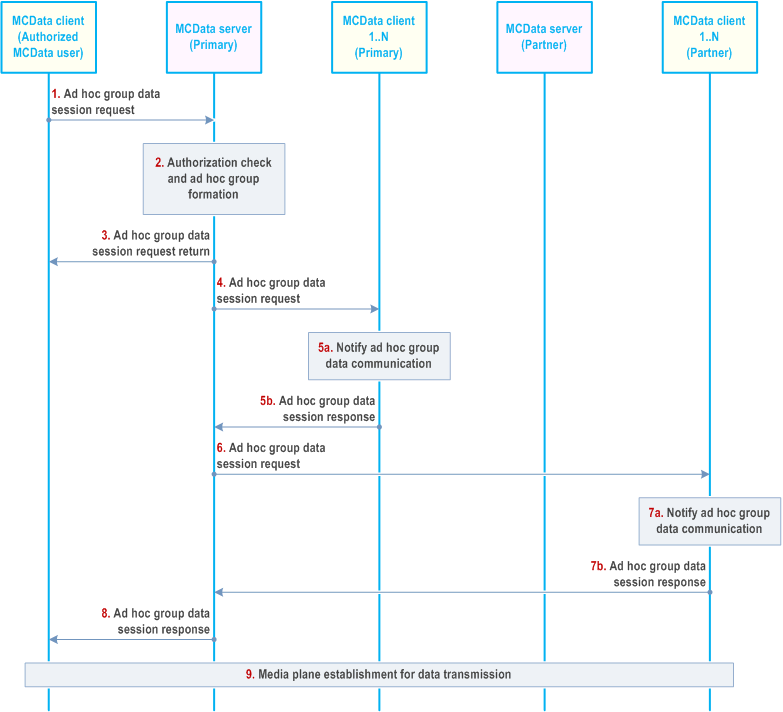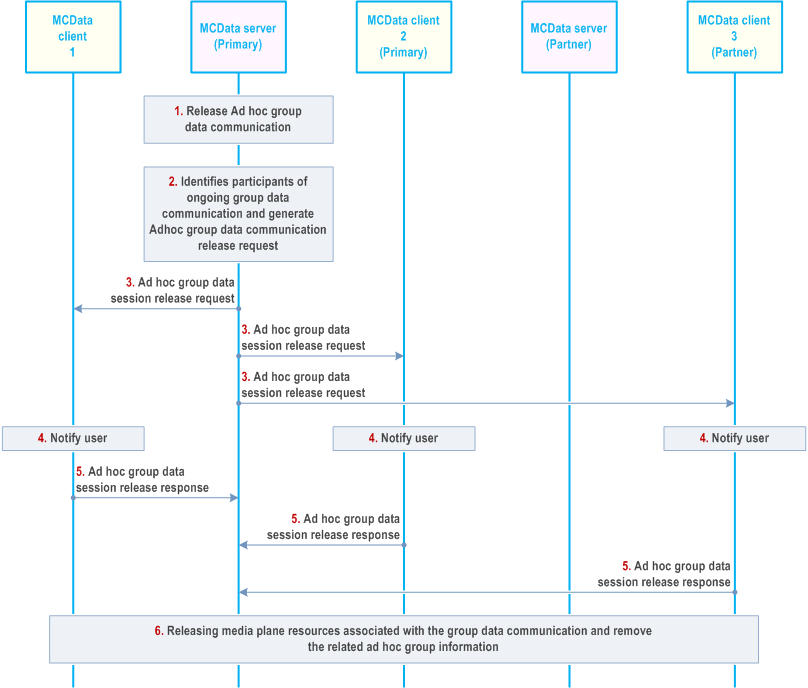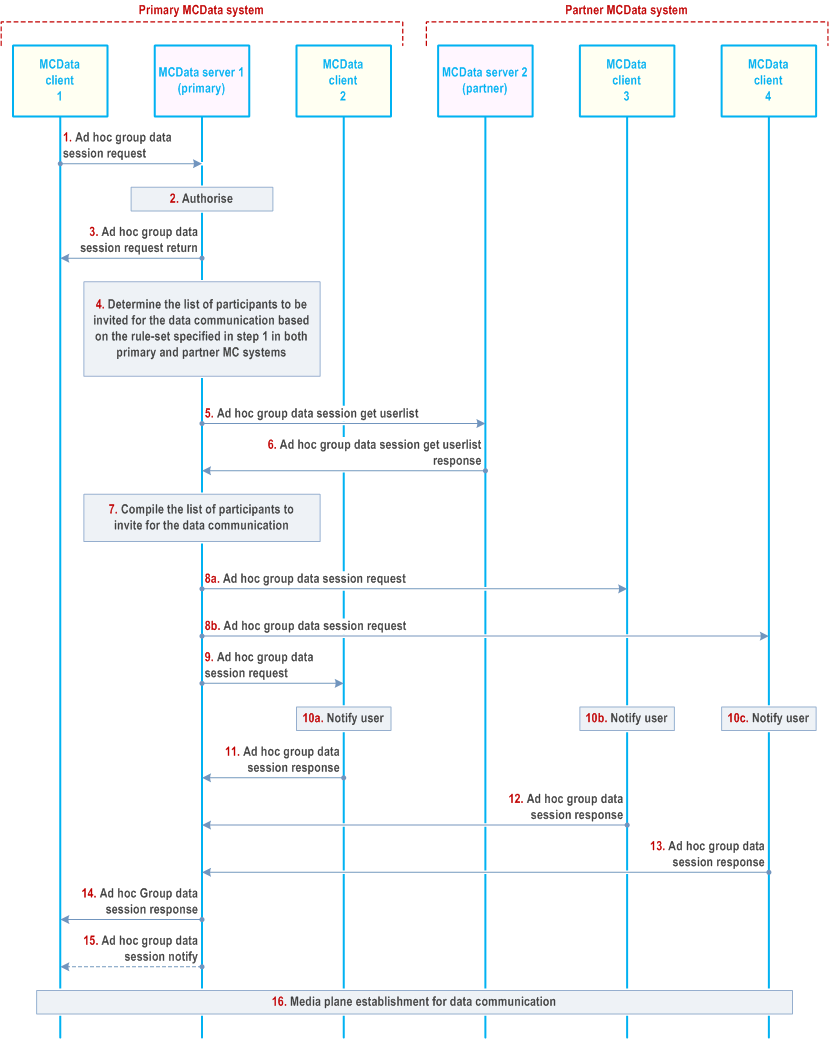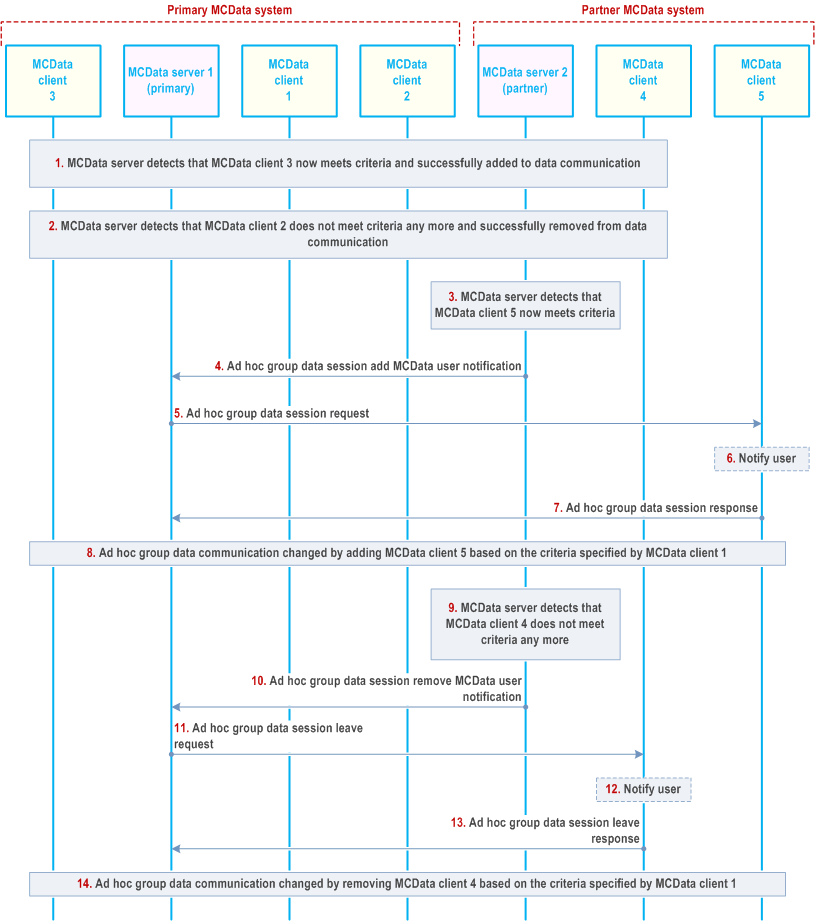Content for TS 23.282 Word version: 19.5.0
1…
5…
6…
6.6…
7…
7.4…
7.4.2.7…
7.4.3…
7.5…
7.5.2.5…
7.5.2.10…
7.5.3…
7.6…
7.7…
7.8…
7.9…
7.13…
7.13.3.14…
7.13.4…
7.14…
7.17…
7.17.3.1.4…
7.17.3.2…
7.17.3.2.5…
7.17.4…
7.17.6…
A…
B…
7.17.3.2 Ad hoc group data communication involving multiple MC systems
7.17.3.2.1 Procedure for ad hoc group data communication setup - Participants list provided by the Initiator
7.17.3.2.2 Procedure for ad hoc group data communication release by MCData server - Participants list provided by the Initiator
7.17.3.2.3 Ad hoc group data communication setup - Participants list determined by the MCData server
7.17.3.2.4 Modifying of ad hoc group data communication participants by the MCData server
...
...
7.17.3.2 Ad hoc group data communication involving multiple MC systems p. 246
7.17.3.2.1 Procedure for ad hoc group data communication setup - Participants list provided by the Initiator p. 246
Figure 7.17.3.2.1-1 illustrates the procedure for ad hoc group data communication setup procedure initiated by an authorized user wherein either a list of participants or an ad hoc group ID from an ad hoc group emergency alert is provided by the authorised user and the determined MCData users are from multiple MCData systems.
Pre-conditions:
- The security aspects of sharing the user information between primary and partner MC systems shall be governed as per the service provider agreement between them. In this case, it is considered that the partner MC system shares their users' information to the primary MC system.
- The authorized MCData user/dispatcher belongs to the primary MC system.
- The MCData server of the primary MC system is where the authorized MCData user/dispatcher creates the ad hoc group.
- Some users of the ad hoc group belong to partner MC systems.
- The preconfigured group identity and preconfigured group configuration (e.g. security related information) to be used for an ad hoc group have been preconfigured in the MCData client and other participants of ad hoc group have also received the relevant security related information to allow them to communicate in an ad hoc group communication.
- If an ad hoc group ID from an ad hoc group emergency alert is used to invite the ad hoc group members, MCData client is aware of the ad hoc group ID.

Step 1.
The MCData client of the authorized user initiates an ad hoc group data communication with multiple users from primary and partner MC systems. An ad hoc group data session request message with the information of the participants MCData IDs or an ad hoc group ID if the ad hoc group call follows an ad hoc group emergency alert is routed to the MCData server of the primary MC system.
Step 2.
If the ad hoc group call is supported, the MCData server of the primary MC system verifies whether the user at MCData client is authorized to initiate an ad hoc group communication. If not authorized, the MCData server of the primary MC system rejects the ad hoc group data session request as specified in the step 3.
If the information received in the request in step 1 does not contain an ad hoc group ID from an ad hoc group emergency alert, the MCData server of the primary MC system forms the ad hoc group by using information received in step 1 and further determines the preconfigured group to be used for the configuration (e.g. security related information). The MCData server assigns an MCData ad hoc group ID for the newly formed ad hoc group.
If no MCData ad hoc group ID was included in the ad hoc group data session request of step 1, or if the provided MCData ad hoc group ID is not accepted by the MCData server, the MCData server assigns a MCData group ID for the newly formed ad hoc group. The MCData server considers the ad hoc group communication participants as implicitly affiliated to the ad hoc group.
Step 3.
The MCData server shall send the ad hoc group data session request return message to MCData client containing the below:
Step 4.
- The MCData ad hoc group ID either generated by the MCData server or provided by the MCData client if the ad hoc group ID is from an ad hoc group emergency alert (only included when the ad hoc group data session request is authorized);
- The group ID of the pre-configured group to be used for the ad hoc group data communication (only included when the ad hoc group data session request is authorized); and
- Result of whether the ad hoc group data session request is authorized or not.
The MCData server of the primary MC system sends the ad hoc group data session request to the group members of the ad hoc group belonging to the primary MC system. While sending the ad hoc group data session requests, the MCData server shall remove the information elements that are not required to be conveyed to the target MCData clients (e.g. MCData ID list of the users who are required to acknowledge).
Step 5a-5b.
The MCData clients receive in the ad hoc group data session request with the information of the MCData group ID for the ad hoc group and further notify their corresponding MCData user. The group members of the ad hoc group of the primary MC system may accept or reject the ad hoc group data session requests and respond with the ad hoc group data session responses.
Step 6.
The primary MCData server further initiates an ad hoc group data session request message to the MCData users of the partner MC system. The ad hoc group data session request message is routed to the MCData users via the MCData server of the partner MC system.
Step 7a-7b.
The MCData clients receive in the ad hoc group data session request the information of the MCData group ID for the ad hoc group and further notify their corresponding MCData user. The MCData users upon receipt of the invitation may accept or reject the ad hoc group data session requests, and respond with the ad hoc group data session responses. The ad hoc group data session response message is routed to the MCData server of the primary MC system via the MCData server of the partner MC system.
Step 8.
The MCData server of the primary MC system provides an ad hoc group data session response message to the MCData client of the authorized MCData user upon receiving response to the corresponding ad hoc group data session request in step 1. The ad hoc group data session response will consist of the success or failure result and/or detailed reason information in case of failure.
Step 9.
Upon successful ad hoc group data session setup, a group data communication is established amongst the group members from primary and partner MC systems. The media plane resources for data communication are established.
7.17.3.2.2 Procedure for ad hoc group data communication release by MCData server - Participants list provided by the Initiator p. 248
This procedure focuses on the case where an MCData server initiates the termination of an ongoing MCData ad hoc group data communication for all the participants of that group data communication, since at least one of the termination conditions are met e.g., due to hang time expiry, last participant leaving, second last participant leaving, initiator leaving, or minimum number of affiliated MCData group members are not present.
Procedures in Figure 7.17.3.2.2-1 are the signalling control plane procedures for the MCData server initiating termination of an ongoing MCData ad hoc group data communication.
Pre-condition:
- The MCData client 1 and MCData client 2 belong to primary MC system. The MCData client 3 belongs to partner MC system.
- The MCData users on MCData client 1, client 2 and client 3 are already part of the ongoing ad hoc group data communication (e.g. as a result of ad hoc group data communication setup as specified in clause 7.17.3.2.1).

Step 1.
The MCData server determines to release the ongoing ad hoc group data communication e.g., due to a hang timer expiry, last participant leaving, second last participant leaving, initiator leaving, or a minimum number of affiliated MCData group members not present.
Step 2.
The MCData server identifies the participants of the ongoing ad hoc group data communication and generates ad hoc group data session release request to release ongoing data communication.
Step 3.
The MCData server sends an ad hoc group data session release request to each participant of the ongoing group data communication. If the participants belong to the partner MC system, then the ad hoc group data session release request is routed to the MCData clients of the partner MC system via the partner MCData server.
Step 4.
The MCData users are notified about the release of the ad hoc group data communication.
Step 5.
The MCData client(s), send an acknowledgment to the MCData server by sending an ad hoc group data session release response.
Step 6.
The MCData client 1, client 2 and client 3 have successfully released media plane resources associated with the ad hoc group data communication that is terminated. The primary MCData server removes the ad hoc group information from the dynamic data and thus the ad hoc group ceases to exist.
7.17.3.2.3 Ad hoc group data communication setup - Participants list determined by the MCData server p. 249
Figure 7.17.3.2.3-1 below illustrates the ad hoc group data communication setup procedure initiated by an authorized user wherein the list of participants is determined by the MCData server based on the citeria received from the MCData client and determined MCData users are from multiple MCData systems.
Pre-conditions:
- The security aspects of sharing the user information between primary and partner MC systems shall be governed as per the service provider agreement between them. In this case, it is considered that the partner MC system share their users' information to the primary MC system.
- The authorized MCData user/dispatcher belongs to the primary MC system.
- The MCData server 1 of the primary MC system is where the authorized MCData user/dispatcher creates the ad hoc group.
- Some users of the ad hoc group may belong to MCData server 2 of the partner MC systems.
- The pre-configured group identity and pre-configured group configuration to be used for an ad hoc group have been preconfigured in MCData client and other participants of ad hoc group have also received the relevant security related information to allow them to communicate in an ad hoc group communication.

Step 1-3.
Same as described in subclause 7.17.3.1.1.
Step 4.
The MCData server 1 determines the list of participants from the primary MC system and determines the partner MC system to be involved in the ad hoc group data communication based on the information present in the information element Criteria for determining the participants. This information element carries the criteria, indicator identifying pre-defined criteria, or a combination of both. Depending on the criteria provided and based on local policy, the MCData server may modify the content of the criteria received in step 1 to determine the list of participants.
Step 5.
The MCData server 1 needs to involve the partner MC system based on the agreement and based on the criteria for determining the participants list, it sends the ad hoc group data session get userlist request to the MCData server 2. This request carries the call resulting criteria to be used by the partner MC system as determined in step 4.
Step 6.
MCData server 2 evaluates the criteria and determines the participants satisfying the criteria (i.e. MCData client 3 and MCData client 4) and sends the response containing the list of MCData users satisfying the criteria. The MCData server 2 may apply local policies if any while determining the participants satisfying the criteria.
Step 7.
The MCData server 1 compiles the list of participants to be invited for the ad hoc group data communication including the participants from both primary and partner MC system.
Step 8a-8b.
The MCData server 1 sends the ad hoc group data session request towards the MCData client 3 and MCData client 4. While sending the ad hoc group data session request, the MCData server shall remove the information elements that are not required to be conveyed to the target MCData clients. This request carries the pre-configured group ID whose configuration is to be applied for this ad hoc group data communication if end-to-end encryption is requested. The MCData server 1 considers the ad hoc group communication participants as implicitly affiliated to the ad hoc group.
Step 9.
The MCData server 1 sends the ad hoc group data session request towards the MCData client 2. While sending the ad hoc group data session request, the MCData server shall remove the information elements that are not required to be conveyed to the target MCData clients. This request carries the pre-configured group ID whose configuration is to be applied for this ad hoc group data communication if end-to-end encryption is requested.
Step 10a-10c.
The MCData clients receive incoming ad hoc group data communication and further notify their corresponding MCData users.
Step 11.
The MCData client 2 accepts the ad hoc group data session request, and sends ad hoc group data session response to the MCData server 1.
Step 12.
The MCData client 3 accepts the ad hoc group data session request, and sends ad hoc group data session response to the MCData server 1.
Step 13.
The MCData client 4 accepts the ad hoc group data session request, and sends ad hoc group data session response to the MCData server 1.
Step 14.
The MCData server 1 sends the ad hoc group data session response to MCData client 1 through the signalling path to inform about result of the participants responses. The ad hoc group data session response contains the call resulting criteria used by the MCData server to determine the list of participants to be invited.
Step 15.
The MCData server 1 may notify the initiating MCData user of all MCData users who acknowledged the ad hoc group data session request and joined the ad hoc group data communication. The MCData server 1 more than once during the data communication may send this notification to the initiating MCData user whenever an MCData user joins or leaves the MCData ad hoc group data communication. If the authorized users (not shown in figure) are configured to receive the participants information of ad hoc group data communication, the MCData server provides ad hoc group data session notify about all MCData users who acknowledged the ad hoc group data session request and joined the ad hoc group data communication, and when MCData users joins or leaves the MCData ad hoc group data communication. All ad hoc group data session notify messages contain the call resulting criteria used by the MCData server to determine the list of participants to be invited.
Step 16.
The MCData client 1, MCData client 2, MCData client 3 and MCData client 4 establish media plane resources for data communication.
7.17.3.2.4 Modifying of ad hoc group data communication participants by the MCData server p. 251
Figure 7.17.3.2.4-1 below illustrates the MCData server modifying the ad hoc group data communication participants procedure involving multiple MCData systems.
Pre-conditions:
- The MCData user at MCData client 1 is authorized to initiate ad hoc group data communication.
- The MCData server 1 of the primary and MCData server 2 of the partner MCData systems determined the participants for the ad hoc group data communication based on the criteria specified by the MCData client 1 while initiating the ad hoc group data communication.
- The ad hoc group data communication is established and on-going with the participants MCData client 1, MCData client 2, and MCData client 4. The participants list is determined by both primary and partner MC systems.
- The MCData server 1 of the primary and MCData server 2 of the partner MCData systems continuously evaluates the criteria to monitor the list of users who meets or not meets the criteria for participating in the on-going ad hoc group data communication.
- The MCData server 1 of the primary MCData system detects that the MCData client 3 meets the criteria and MCData client 2 stops to meet the criteria specified by the MCData client 1.
- The MCData server 2 of the partner MCData system detects that the MCData client 5 meets the criteria and MCData client 4 stops to meet the criteria specified by the MCData client 1.

Step 1.
The MCData server 1 detects that MCData client 3 now meets criteria and successfully added to group data communication.
Step 2.
The MCData server 1 detects that MCData client 2 does not meet criteria any more and successfully removed from a group data communication.
Step 3.
The MCData server 2 detects that the MCData client 5 meets the criteria specified by the MCData client 1.
Step 4.
The MCData server 2 sends the notification to MCData server 1 of the primary MCData system to add the MCData user at MCData client 5 to on-going ad hoc group data communication.
Step 5.
The MCData server 1 sends the ad hoc group data session request to the MCData client 5.
Step 6.
The MCData client 5 notifies the user about the incoming ad hoc group data communication.
Step 7.
The MCData client 5 accepts the ad hoc group data session request and sends the ad hoc group data session response to the MCData server 1.
Step 8.
The on-going ad hoc group data communication is updated by adding MCData client 5 which meets the criteria specified by the MCData client 1.
Step 9.
The MCData server 2 detects that the MCData client 4 is no longer satisfying the criteria to be the participant of the ad hoc group data communication.
Step 10.
The MCData server 2 sends the notification to MCData server 1 of the primary MCData system to remove the MCData user at MCData client 4 from on-going ad hoc group data communication.
Step 11.
The MCData server 1 sends the ad hoc group data session leave request to the MCData client 4 and removes it from the on-going ad hoc group data communication.
Step 12.
The MCData client 4 notifies the user of the ad hoc group data session leave request.
Step 13.
The MCData client 4 sends the ad hoc group data session leave response to the MCData server 1.
Step 14.
The on-going ad hoc group data communication is updated by removing MCData client 4, which no longer meets the criteria specified by the MCData client 1.